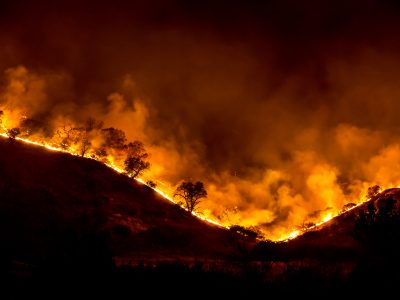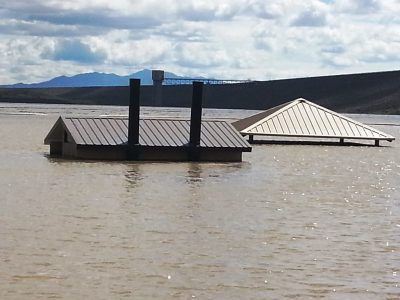risk
How Does Increasing Wildfire Risk Affect Insurance in California?
Affordability and Availability of Wildfire Insurance Are Less Stable Under Changing Conditions
(This post is part of a series on the issue of climate change and insurance that my colleague Ted Lamm and I are writing, inspired by a symposium that the law schools co-organized with the California Department of Insurance earlier this year. You can find more information on the symposium here. Ted’s prior related post …
Continue reading “How Does Increasing Wildfire Risk Affect Insurance in California?”
CONTINUE READINGClimate Change and the Insurance Sector: An Overview
The Insurance Industry Grapples With Changing Risks in a Changing Climate
(This post is part of a series on the issue of climate change and insurance that my colleague Ted Lamm and I are writing, inspired by a symposium that the law schools co-organized with the California Department of Insurance earlier this year. You can find more information on the symposium here. Ted’s prior related post …
Continue reading “Climate Change and the Insurance Sector: An Overview”
CONTINUE READINGRisk Subsidies and the Future of Nuclear Power in the U.S.
Should We Take Into Account Government Subsidies that Reduce the Risks Borne by the Nuclear Industry as We Consider Our Energy Future?
As I’ve written about before, U.S. law massively subsidizes the nuclear power industry. In particular, a law called the Price-Anderson Nuclear Industries Indemnity Act dramatically skews the incentives to develop nuclear plants, and to site them in places where there is a lot of risk, because it requires the public to bear much of the …
Continue reading “Risk Subsidies and the Future of Nuclear Power in the U.S.”
CONTINUE READING“You’re Just Not My Type (of error)”
Most people find statistics off-putting — who wants to look at a bunch of numbers? And Statistics courses, which are required for students in many majors, are usually viewed as a painful box to check. But when you put aside the numbers and the technicalities, statisticians also have some simple yet powerful concepts. One of …
Continue reading ““You’re Just Not My Type (of error)””
CONTINUE READINGThe Ebola Panic
Some politicians encourage panic about a small outbreak in Texas, while thousands in Africa are dying.
The National Lampoon once put out a mock edition of a newspaper from the fictional city of Dacron, Ohio. There was a screaming headline reading: TWO DACRON WOMEN MISSING. A much smaller subheading read: Japan destroyed by tidal wave. We are now seeing something similar in the U.S. reaction to Ebola. So far, only three cases …
Continue reading “The Ebola Panic”
CONTINUE READINGThe story of the Price-Anderson Act: how Congress made nuclear power financially viable in the U.S. by eliminating accountability for risk
Ever wonder how nuclear power plants have been able to get financial backing in the U.S. despite the huge, and largely uncertain, potential risks they pose? Or why there are nuclear plants within a few hours’ drive of major population centers such as Los Angeles and New York? Or who will pay the costs that …
CONTINUE READINGPlastic, plastic everywhere . . . .
Several months ago, I noted a controversy about the chemical bisphenol-A and its former ubiquity in water bottles. Up until very recently, despite reports by the Environmental Working Group and others that suggested significant health risks from BPA, our federal government showed no inclination to regulate the use of the chemical in consumer products. The …
Continue reading “Plastic, plastic everywhere . . . .”
CONTINUE READINGInsurance in a Complex World
Roger Cook and Carolyn Kousky make some intriguing points in an article in the Summer issue of Resources. They discuss three problems confronting insurance companies, all of them probably exacerbated by climate change: fat tails, tail dependence, and micro-correlations. Although the names may not be self-explanatory, these are phenomena with great significance for society’s management …
Continue reading “Insurance in a Complex World”
CONTINUE READINGThe Death of Yucca Mountain
Over twenty years ago, the Supreme Court accepted the Nuclear Regulatory Agency’s assurances that it would find a safe method for long-term disposal of nuclear waste. Consequently, the NRC was allowed to assign a zero to the risk of any radioactive discharge. As it turns out, this was an empty promise. The solution that the …
Continue reading “The Death of Yucca Mountain”
CONTINUE READINGNew EPA air toxics report presents sobering assessment of cancer risk
A new U.S. EPA report released today presents a scary picture of our exposure to hazardous pollutants in our air. The National-Scale Air Toxics Assessment for 2002, which analyzed health data based on chronic exposure to air toxics for 124 pollutants for which those data are available. (The assessment’s name is potentially confusing; the report …
Continue reading “New EPA air toxics report presents sobering assessment of cancer risk”
CONTINUE READING






